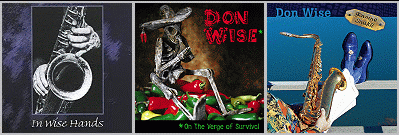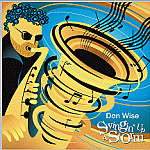|
|
Don Wise
Interview - June 2005. |
1) You have 20 years long career of successful sax player.
Can you remember your beginning. How it was?
I have been with Delbert McClinton for 20 years but played
with many other bands starting in the late 1950s when I was 15 years old. I
was in a band named the RHYTHM ROCKERS in 1958 when rhythm & blues was turning
into rock 'n roll.
2) Modern music is mainly recognized / determined by guitars
as leading and the most accepted instrument. What motivated you to select saxophone
as instrument for expressing of your music?
When I was excited about the music I was hearing on the radio
late at night from New York it was all Rhythm & Blues. The R&B stars
were coming out of the big band swing era that was very much horn driven. I
was hearing Wynonie Harris, Louis Jordan, Big Joe Turner and Ray Charles. All
of them with 'honkin' sax soloists!
3) Who were sax players that influenced your music style and
why?
There were very major sax influences on me from the beginning.
My favorite was (and still) is Red Prysock! ... Other sax players I consider
influences were: Sam "The Man" Taylor, Earl Bostic, David "Fathead"
Newman (From early Ray Charles era), King Curtis, and later Sam Butera and "Junior"
Walker.
4) What condition have to satisfy musicians which are selected
by yourself to be part of some of your solo project? Do you have steady team
of musicians or you prefer to change them from project to project?
Since I've played in so many different groups & styles
I have many friends that have musical styles that I know will sound better on
certain songs I choose for my CDs. For instance, on "Honky Tonk Song /
Honky Tonk", I knew Steve Williams was the perfect guitar player because
he plays the guitar solo like it was on the 1957 Bill Doggett original. And
it saves time (and money!) to have people who can bring their talent to the
table and using their expertise play or sing exactly the sound I want.
5) I noticed that you are always underlining role of other musicians participating
in your solo projects whenever you are talking about them (what is really positive
habit). We must admit - such attitude is not common among your colleagues on
the music market. How do you explain that?
As a sideman myself for so many years, I have played with many
great musicians who rarely get recognition. Also there are so many good singers
and players that most people wouldn't get to hear because they haven't had the
opportunity to record or be heard outside of Texas, Tennessee or Bosnia for
that matter.
6) Some decades ago, the bands with saxes and trumpets were common issues and
were very popular on the world music scene (let me mention only two - Chicago
and Blood Sweat and Tears). What is your opinion - why nowadays music scene
does not recognises bands structured in such way?
There are many reasons: Synthesizers---the economics of having
an extra instrument---a certain sound (Blood Sweat & Tears for instance)
runs it's course and people go on to something newer and different.
7) The people which appreciate your music are your fans. Which
fan you are?
I see and hear so many musicians and singers almost on an everyday
basis that most are in the very average category. One after another they all
begin to sound like each other (and not in a good way) and without real musicianship
or emotion. Staying with the subject we started with: there must be a billion
people playing guitars and I DO have a few favorites. Albert Collins, Stevie
Ray Vaughn, Clarence "Gatemouth" Brown, and I think Todd Sharp (from
my 2nd & 3rd CDs) is probably the all-around, best guitar player I've heard.
He doesn't try to take over the band with guitar volume; he helps the overall
sound of the band by being an essential part of the sound structure and support
of all...and when it's time to solo he's fantastic! FAN? I will always be a
fan of Ray Charles! Others I like are James Taylor---Keb Mo---Los Lonely Boys---there
is a singer from Norway on my 1st CD named Britt Johansen that has a wonderful
voice and many faceted style... I think Eminem is brilliant---and a couple of
singer songwriters I like a lot are Fred Eaglesmith and Paul Thorn...
|

|

|
8) You signed four projects: In Wise Hands, On the Verge of
Survival, Genuine Snake and Swingin' Up a Storm. Would you be so kind to describe
each of them, shortly. Which points of these projects were common, which were
not?
Keeping in mind that there are some musical gems on all four
CDs, I define them like this: When I made my first CD "In Wise Hands"
I had so many ideas because of my musical background that I think it is a little
scattered and mixed up stylistically. I didn't know at the time if I would be
fortunate enough to do more CDs, so I put a variety of things I always wanted
to do and songs that I wrote on it. #2 "On the Verge of Survival"
came closer to the R&B target I was aiming at and #3 "Genuine Snake"
actually hit the bullseye! #4 is a compilation of the "Swing" &
"Shag" dancers' favorite picks from my first three CDs plus 3 new
songs.
9) Standard question - what brings near future in regard to new recordings of
yours?
I'm always thinking and writing new lyrics and when the smoke
clears from "Swingin' Up A Storm" and the others, I'll be putting
down #5.
10) May I ask you for personal message to the listeners of
The Jeans Generation (radio show)?
I have always found the audiences in Europe and Scandinavia
to be better listeners and more "UP" and informed on different styles,
not just what is popular at the moment. Whatever cultural differences they have
helps them appreciate something not the average so I have no worries that they
will like or not like my music. I simply offer it to them! And Thank You for
listening,
| 
